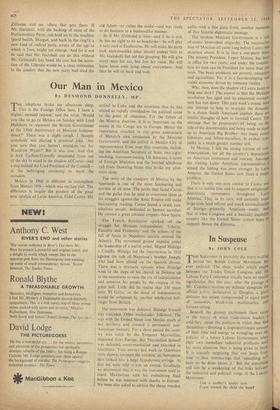Our Man in Mexico
By DESMOND DONNELLY, MP Mexico in 1960 is different in atmosphere from Mexico I956--which was my last visit. The difference is largely the product of the great new catalyst of Latin America, Fidel Castro. His arrival in Cuba and the emotions that he has stirred so rapidly overshadow the political scene to the point of obsession. For the future of the Monroe doctrine, it is as important as the events in the Congo are to Europe. Hence the importance attached to this great anniversary of Mexico's own revolution by the Mexican Government, and the arrival in Mexico City of representatives from over fifty countries, includ- ing the American Secretary of State, two cigar- smoking, statement-issuing US Senators, a score of Foreign Ministers and the hurried telephone call from Downing Street that broke my after- noon sleep.
The story of the conquest of Mexico by the Spaniards is one of the most fascinating and terrible of all time. The perils that faced Cortes and the guiles that he used to overcome them in his struggles against the Aztec Empire still make hair-raising reading. Cortes found a cruel, can- nibalistic people, dedicated to human sacrifice. He created a great colonial empire—New-Spain.
The French Revolution sparked off the struggle for Mexican independence. 'Liberty, Equality and Fraternity' and the echoes of the fall of Spain to Napoleon quickly crossed the Atlantic. The movement gained impetus under the leadership of a parish priest, Miguel Hidalgo y Costilla. Hidalgo led the insurrection in 1810 against the rule of Napoleon's brother Joseph, who had been placed on the Spanish throne. There was a dramatic episode when Hidalgo went to the steps of his church in Dolores up in the mountains to raise the cry of independence and summon his people by the ringing of the great bell. Little did he realise that 150 years later 'El Grito,' or the shout of independence, would be witnessed by another celebrated bell- ringer from Britain.
The movement was defeated. Hidalgo himself was executed. Other vicissitudes followed. The war with the United States cost Mexico much of her territory and created a permanent anti- American memory. For a short period the coun- try was ruled by the Emperor Maximilian, imported from Europe. But Maximilian himself was defeated, court-martialled and executed in Queretaro. Your envoys last week in Queretaro were shown. amongst the exhibits, an instrument that looked like a huge hypodermic syringe. At first we were told it was an enema. Gradually we discovered that it was the instrument used to inject Maximilian with his embalming fluid before he was returned with thanks to Europe. We were also asked to admire the cheap wooden coffin with a fine glass front, another memento of that historic diplomatic message. The modern Mexican Government is a left' of-centre benevolent oligarchy. The nationalisa- tion of Mexican oil came long before Castro was dreamed about. It is in fact a one-party State. The present President, Lopez Mateos, has been in office for two years; and under the constitu. lion no man can be President for more than one term. The basic problems are poverty, education and agriculture. Yet it is a fast-developing and viable economy driven by immense vitality.
Why, then, does the shadow of Castro loom so long and dark? The answer is that the Mexican revolution has aged and its emotional momen' tum has run down. This past week's events were one attempt to help to re-create the dynamic- In a dozen South American capitals there ate similar thoughts of how to forestall Castro. The message that he propounds—of being on the side of the downtrOdden and being ready to stand up to American Big Brother—has many actual followers and fellow-travellers. It evokes synr pathy in a much greater number still. In Mexico, I felt the strong current of anti' Americanism, for all the country's dependence on American investment and tourism. Amongst the visiting Latin American representatives sensed the feeling was even stronger. In Latin America, the United States now faces a major problem.
There is only one easy answer to Castro and that is to outbid him and to support enlightened
democratic movements throughout I -atal America.' That, in its turn, will certainly marl large-scale land reform and much nationalisation of foreign—primarily American—assets. And that is what Congress and a basically capitalist country like the United States cannot hope to support. Hence the dilemma.














































 Previous page
Previous page